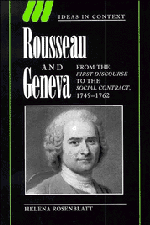Book contents
- Frontmatter
- Contents
- Acknowledgments
- Note on translation
- List of abbreviations
- Introduction. Rousseau in a Genevan context
- 1 The formation of a “citizen of Geneva”
- 2 Rousseau becomes Rousseau, 1751–1754. Geneva, doux commerce, and Rousseau from the First to the Second Discourse
- 3 Rousseau and natural law: the context
- 4 Rousseau and natural law: the Second Discourse
- 5 The “invisible chain”: Rousseau and Geneva from the Second Discourse to the Social Contract
- 6 The Social Contract
- Epilogue
- Select bibliography
- Index
- IDEAS IN CONTEXT
2 - Rousseau becomes Rousseau, 1751–1754. Geneva, doux commerce, and Rousseau from the First to the Second Discourse
Published online by Cambridge University Press: 28 October 2009
- Frontmatter
- Contents
- Acknowledgments
- Note on translation
- List of abbreviations
- Introduction. Rousseau in a Genevan context
- 1 The formation of a “citizen of Geneva”
- 2 Rousseau becomes Rousseau, 1751–1754. Geneva, doux commerce, and Rousseau from the First to the Second Discourse
- 3 Rousseau and natural law: the context
- 4 Rousseau and natural law: the Second Discourse
- 5 The “invisible chain”: Rousseau and Geneva from the Second Discourse to the Social Contract
- 6 The Social Contract
- Epilogue
- Select bibliography
- Index
- IDEAS IN CONTEXT
Summary
The fame of the First Discourse had important consequences for Rousseau's life and career as a writer. According to his own account, celebrity only confirmed his desire to reject French culture and society. When he heard that his essay had been awarded first prize by the Dijon Academy:
The news reawakened all the ideas that it had suggested to me, endowed them with fresh vigour, and set that first leavening of heroism and virtue working in my heart that my father, my native land, and Plutarch had implanted there in my childhood.
He resolved to reform himself and his lifestyle, so that, from then on, his conduct would conform to his principles.
Initially, returning to Genevan values meant giving up his career as a writer and taking up the artisanal occupation of music copying. As he recalls in the Confessions, he “renounced for ever all plans for fortune and advancement.” It is noteworthy, in this regard, that the first time Rousseau used the title “citizen of Geneva” was actually in a letter to Voltaire in which he announced his renunciation of his career as a writer.
But the polemic stirred up by the First Discourse forced Rousseau to pick up his pen again, if only to defend and clarify his ideas; and it was in the course of responding to his critics that Rousseau came to deepen his analysis of society's ills. Between 1750 and 1754 Rousseau developed his mature and original social philosophy, his “sad and grand system.”
- Type
- Chapter
- Information
- Rousseau and GenevaFrom the First Discourse to The Social Contract, 1749–1762, pp. 46 - 87Publisher: Cambridge University PressPrint publication year: 1997



